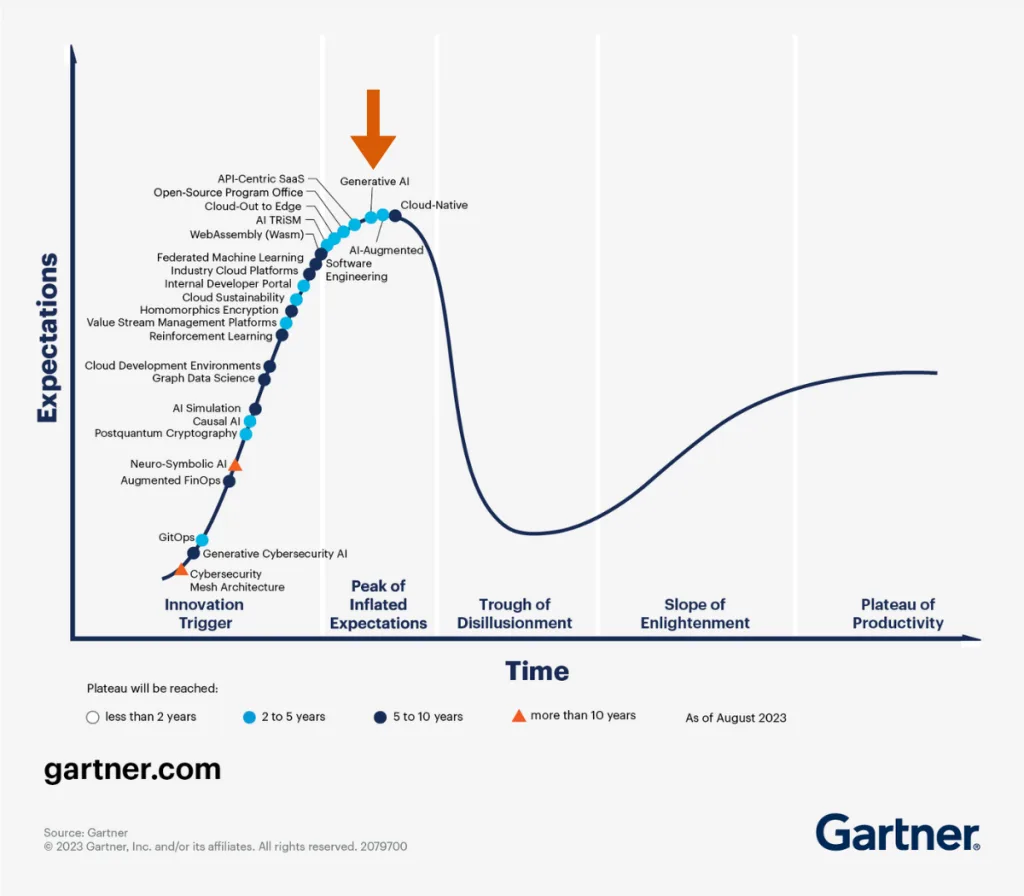
Contributing Authors & Industry Experts: Jean-Pierre Segers (Brains & Trees; UHasselt; lead author),
Jos Duchamps (Brains & Trees; Procos Group), Ruben Delvaeye (Buildwise), Sven Nicolai (VITO), Tom Ryckaert (IFMA Belgium Chapter; Procos Group), Lin Yang.
Introduction
In these fast-changing times, artificial intelligence (AI) is definitely a hot topic right now, but it’s more than just hype. The rapid advancements in AI are transforming how we live and work. AI has indeed gained significant momentum over the past year(s). The impact of AI on the economy, science, and innovation is growing exponentially. In the world economy, AI is expected to contribute significantly to improved productivity, economic growth, and new job opportunities. The latter is also transforming existing roles while requiring new skills and competences, such as adaptation and resilience. Several studies suggest that AI makes workers more productive and leads to higher-quality work. These studies also demonstrated AI’s potential to bridge the skill gap between low- and high-skilled workers [AI Index Report, Stanford University, 2024]. Generative AI investments by major players and gatekeepers in the generative AI space have skyrocketed, together with regulatory frameworks such as the EU Artificial Intelligence Act.
Is AI Shaping the Future of Facility Management?
This White Paper is the result of a Master Class organized by Brains & Trees in Brussels on June 26th. In a 3-hour roundtable session, the focus was on understanding best practices from industry’s leading organizations, such as Buildwise, VITO, and the IFMA Belgium Chapter, while exploring the opportunities and challenges that arise when AI intersects with the built environment and facility management.
The AI (r)evolution
Artificial Intelligence was first mentioned back in the 1950s and has evolved substantially due to increased computing power. There is no universally accepted definition. AI is the demonstration of cognition and creative problem solving by machines rather than humans, ranging from narrow AI, designed to solve specific problems, to Artificial General Intelligence (AGI), a future system to match or exceed human capability and intelligence.
We have come to know terminology such as deep learning, machine learning, foundation models, generative AI and large language models such as Open AI’s
ChatGPT and Meta’s LLaMA. Foundation models are the building blocks of next-gen AI, i.e. large-scale machine learning models pre-trained on extensive datasets.
Generative AI is a type of AI capable of creating a range of outputs including text, images or media. AI and machine learning are general purpose technologies already starting to transform the global economy. Generative AI is at the “peak of inflated expectations” [Gartner, 2023*] where many companies are taking action, with many not just yet.

Greater knowledge and capital intensive (capex) investments are key drivers for AI-euforism. On the other hand, the transition from AI as an academic discipline to a potential profit-generator is under pressure, as they are transforming business models across many sectors.
Understanding Good Practices
Will AI be a gamechanger ? Only by fully embracing it can we make it work for us. To help industries, companies and organizations cope and evolve with rapidly changing technology and adapt to market changes, we need to foster innovation and technological collaboration. This calls for an environment encouraging collaborative learning, open innovation and experimentation.
The latter was emphasized in the round table gathering when discussing topical academic research, industry cases and good practices.
AI is a journey to be undertaken for the FM profession and there is still a long way to go. Knowledge and understanding of FM is essential for the development of high-performance field-focused AI solutions. According to IFMA Belgium Chapter, the FM sub-areas where AI can offer the most added value are: technical maintenance, space and workplace management and catering, cleaning and sustainability (e.g. energy management; water monitoring).
Although AI is in its nascent stages (cfr. the “peak of inflated expectations”), it is changing the built environment and facility management in a number of ways, as is demonstrated by the Buildwise and VITO good practices, showcasing their practical approach to implementing AI within their organization and for FM:
- AI powered design
- Project planning and management
- Site follow up, execution and risk management
- Building information modeling (BIM) with generative AI for data-driven decision-making
- Procurement and contract drafting
- Construction automation and robotics
- AI solutions and new business models related to predictive maintenance (using reinforcement learning) and rapid-response corrective maintenance
- FM software and AI-based solutions
- Life cycle assessment and end of life in construction
- Regulatory compliance
Key Takeaways
Artificial Intelligence creates new opportunities for the built environment and the
Facility Managers to focus on the (big)data. To identify better ways of doing complex tasks and to increase analytical, decision-making and reflective time. Embracing AI is about fostering awareness and incorporating innovation into existing and future projects.
- big data in FM to support data-driven decision-making
- increase employee commitment
- improve operational efficiency
- improve user performance
- AI skilled staff – sourcing employees with the right skills
- a very heterogeneous and distributed IT landscape
- sufficient qualitative, accessible data (data management strategy)
- investing in smart buildings
- cost of implementation
- continuing technological development

Brains & Trees is a training company for both aspiring and seasoned Facility Management professionals. Our aim is to close the growing skills gap in the industry and to fuel lifelong learning.
If you want to receive the detailed information shared in the Master Class contact us on info@brainsandtrees.com or www.brainsandtrees.com



